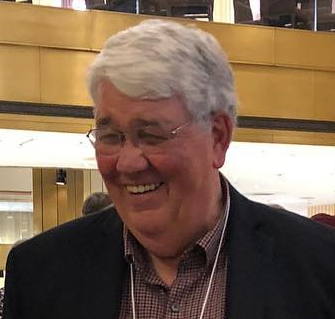Jim Nestingen Tribute


I first got to know the name James Nestingen through what I still believe is the best confirmation text ever produced — the first edition of Free to Be co-written with Gerhard Førde. (Jim was unhappy with the later revision of it by AugsburgFortress.)
But while I heard him speak from time to time, the first occasion I spent at length with him was the Lutheran CORE Conference at Lindenhurst, Illinois, on September 28, 2007. Many of Jim’s friends and students describe him with the word “prophet,” and he was certainly in full prophetic mode at that event regarding the directions the ELCA was taking. The event gathered those of us who would lead the response to the sexuality decisions that would be made a few years later, leading to the change in strategy of Lutheran CORE and the formation of the North American Lutheran Church.
Jim represented a somewhat different version of Lutheranism than I had grown up with in my eastern LCA context, and I found it enlightening and refreshing, not to replace but to supplement the ways I had come to understand the faith. I learned from him to say with regularity, “we sinners,” as I would preach and teach. Jim would tell us that we should always listen for a confession in conversations with people. He understood the brokenness of our fallen world, and exulted in the Word of absolution that we dare to speak on the authority of the Son of God Himself.
Not that Jim ever claimed to be anything other than one of “us sinners.” And he could sin boldly from time to time. For him, theology was not an abstract intellectual enterprise, but God’s life-saving intervention in the world with the Word of Life we are empowered to speak through Jesus. He stood on “grace alone,” knowing that even our repentance is God’s gift through the Holy Spirit, channeled through the Word and the Sacraments.
Jim was not given to moderation, because his life was a huge love affair with Jesus. He and I had one difficult time when he demanded that Lutheran CORE rescind our invitation to a speaker with whom he had personal and theological conflicts. When we refused, our relationship was tense for a while, but we both moved beyond it. Lovers sometimes over-react, and Jim threw his whole being into the service of the Lord he loved. He was indeed a jealous lover of the Lord who he knew loved him with the same intensity.
As a speaker, nobody could hold the attention of an audience, lay or clergy, as well as Jim could. His repertoire of Sven, Ole, and Lena jokes along with often-scatological humor (which prevented most preachers from stealing his material) interfaced well with his profound theological insights, always centering on the Word of forgiveness Jesus proclaims through us. His North Dakota Scandinavian farmer persona helped humanize his brilliant teaching, and he could share personal stories of his encounters with real people and how the Word of forgiveness encountered them. Often he and all his hearers were in tears as he recounted these stories, even stoic Germans like me.
I still remember his story of visiting a dying friend, whispering in his ears as he was leaving this life, “The next voice you hear will be Jesus.” That is how real and concrete Jim’s faith was, and I know I became a better pastor because of my contacts with him.
Jim has been bothered these last years by painful ailments, and while he limited his travel he still managed to make it to NALC conferences and events, and to serve on our Commission on Theology and Doctrine (CTD). He arrived early in Dallas for the CTD meeting in November as my deans’ meeting was ending, so we got to spend a little time conversing together. While he was in obvious pain, somehow he found a way to fly there and continue to offer his guidance to the church body he helped bring into existence. I remember with thanksgiving these last conversations I had with him until we two redeemed sinners meet again around the Throne.
His death was sudden, and there was evidently nobody to whisper in his ear, “The next voice you hear will be Jesus.” But Jim already knew the voice of the Good Shepherd whom he loved and served so faithfully, and he surely knew Who was welcoming him into his heavenly home.

 newal, for both church and society, for several reasons. First, it renews the church because it puts the church back where it belongs: in front of the empty tomb, facing the wide-open future that shines in the face of Christ. Like the empty tomb, forgiveness doesn’t erase the past. To the contrary, it carries the past forward — He’s still the man who died on the cross, wounds and all — but in such a way that this person with such a past may yet live, love, be worthy, and even rule. What excitement! What release!
newal, for both church and society, for several reasons. First, it renews the church because it puts the church back where it belongs: in front of the empty tomb, facing the wide-open future that shines in the face of Christ. Like the empty tomb, forgiveness doesn’t erase the past. To the contrary, it carries the past forward — He’s still the man who died on the cross, wounds and all — but in such a way that this person with such a past may yet live, love, be worthy, and even rule. What excitement! What release!  Yet this absolution, coming from God, may renew things well beyond the church, because God’s goodness always seems to spill over its borders. The absolution carries in itself more than a new future and a happy Lord. It carries also the stamp of that Lord’s virtue and wholesome way. To trust forgiveness is to trust patience and compassion—who can forgive a sinner without taking the time to sympathize with him? And for Christians to trust and preach forgiveness is to trust and preach Christ crucified, the very picture of God “counting others better” than Himself (Philippians 2:3). When that image and rumor of mercy start permeating Christians, and Christians start seeping into society and infecting it, they take that virtue and ethic with them.
Yet this absolution, coming from God, may renew things well beyond the church, because God’s goodness always seems to spill over its borders. The absolution carries in itself more than a new future and a happy Lord. It carries also the stamp of that Lord’s virtue and wholesome way. To trust forgiveness is to trust patience and compassion—who can forgive a sinner without taking the time to sympathize with him? And for Christians to trust and preach forgiveness is to trust and preach Christ crucified, the very picture of God “counting others better” than Himself (Philippians 2:3). When that image and rumor of mercy start permeating Christians, and Christians start seeping into society and infecting it, they take that virtue and ethic with them.